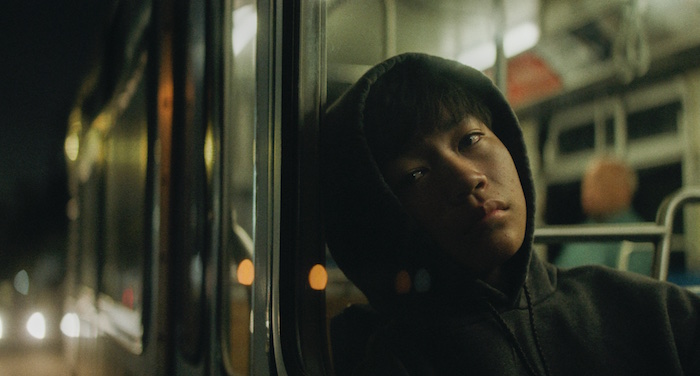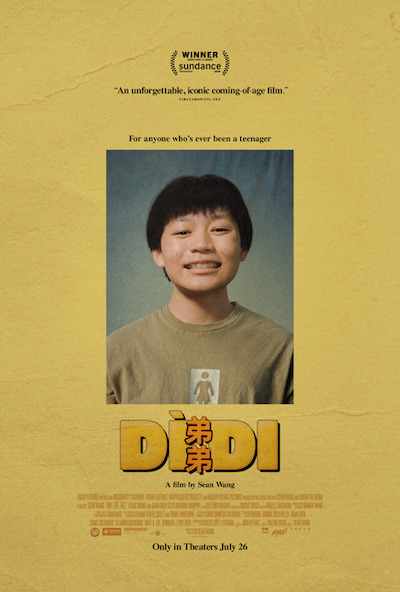
Filmmaker Sean Wang recently came to prominence with his Academy Award nominated Nai Nai & Wai Po, a documentary short about his grandmothers. It was filmed during the pandemic when Wang returned home to the Bay Area.
Wang’s follow-up and feature-length debut is DiDi, which finds its title from the Mandarin word that means both “little brother” and “youngest son.” The titular DiDi is Chris Wang (Izaac Wang), a 13-year old Taiwanese-American teenager growing up in Fremont, a city near Silicon Valley with a heavy population of Asians. Chris is nicknamed Wang-Wang by his small circle of friends whose camaraderie is defined by calling each other gay. Summer is coming to a close as Chris prepares for his first year of high school. The year is 2008 and social media is reflective of the era. The movie opens with Chris and his pals blowing up a neighbor’s mailbox with firecrackers, then uploading the video to YouTube, which is still in its infancy. Chris chats with his peers on AOL Instant Messenger and gauges most of his self-worth on his friend’s Top 8 rankings on MySpace. Remember, Tom?
The prologue ends with a freeze frame of a fresh faced Chris. The next time we see him, he’s a sullen teen with acne on his right cheek. He’s got a tumultuous relationship with his older sister Vivian (Shirley Chen), who is about to depart for UC San Diego. They scream at each other and trade insults at the dinner table to the exasperation of their weary mother Chungsing (Joan Chen). It doesn’t help that her mother-in-law Nai Nai (Zhang Li Hua, Sean Wang’s actual granny and star of his documentary short) lambastes Chungsing for her inability to govern the children or properly run their single-story suburban household. Scenes in Chris’s room were filmed in Sean Wang’s actual childhood home with all the posters still hanging on the walls.
Chungsing herself has given up her dreams of being a renowned artist. The paintings she has proudly completed are met with cold indifference from her children. Her husband still lives in Taiwan, sending them money from overseas. He is never seen or heard from. For Chris, it feels like he can never live up to the expectations of his mother, especially when compared to other more studious sons.
Sean Wang takes a languid approach to the narrative as we follow the protagonist bouncing from one group of friends to another. Though Chris is happy to trade profane insults with best buds Fahad (Raul Dial) and Soup (Aaron Chang), he seizes the opportunity to ingratiate himself with a group of older teens by recording skate videos to highlight their skills. Nevermind the fact that he has to consult the internet to learn skate slang and filming techniques more sophisticated than his amateurish Jackass-style vids. There’s the awkward date with the pretty Madi (Mahaela Park) as Chris stalks her profile page and pretends to like all the same things she does. Don’t worry, she still likes him even after he sheepishly admits to never seeing Star Wars or Jaws. It’s when she leans in for that first kiss that Chris panics, eventually blocking Madi on AIM, rather than admit his embarrassment. At his lowest point, Chris can only confide with a bot, an early progenitor of ChatGPT, about how he’s pushed everyone away.
Young Izaac Wang is a revelation as Chris, after appearing in smaller roles in films like Good Boys, Clifford the Big Red Dog, and Disney’s Raya and the Last Dragon. His performance comes off as completely authentic and never forced. Apparently, the young actor’s only struggle was trying to figure out those old flip phones. The legendary Joan Chen is equally amazing, especially in some of the film’s more quiet moments. There’s something endearing about watching her deconstruct a McDonald’s hamburger to eat with a knife and fork, a habit that Chris finds immensely embarrassing. Aside from Chen and voiceover cameos from Stephanie Hsu and Spike Jonze, DiDi’s cast is primarily made of first-time, non-professional actors, all of whom successfully make the audience feel as if it were dropped right into a documentary.
DiDi works because Sean Wang eschews stereotypes and mawkish sitcom endings where everything works itself out. A final denouement shows things will get better for Chris, but not all relationships can be mended.
As a son of Chinese immigrants, I can immediately relate to the story of Chris. From the awkward adolescent years, the exasperating attempts to connect with other people to the pressures put upon us by our families, it feels like parts of my life transposed to the big screen (minus the firecrackers). Still, there are universal themes in DiDi’s coming-of-age story that makes it just as relatable, regardless of your ethnicity.
DiDi is currently available for purchase digitally and can be seen in select theaters.
Film Rating: 8

